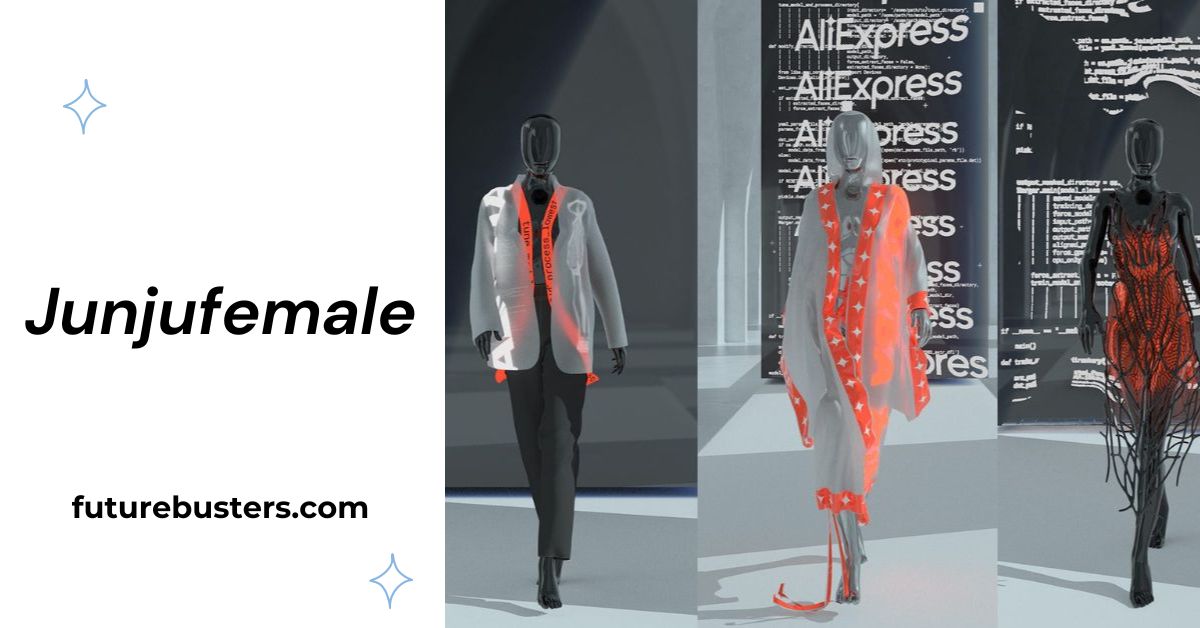Junjufemale – A Pioneer in Sustainable Fashion

Junjufemale has emerged as a leading name in sustainable fashion, offering eco-friendly and ethically-produced women’s clothing. This article delves deep into the world of Junjufemale, exploring its origins, mission, products, and impact on the fashion industry. We’ll uncover what sets this brand apart and why it’s gaining popularity among environmentally conscious consumers in the USA and beyond.
The Birth of Junjufemale
Junjufemale was founded in 2015 by Sarah Chen, a fashion designer with a passion for sustainability. Growing up in California, Chen witnessed firsthand the negative effects of fast fashion on the environment. This experience inspired her to create a brand that would prioritize both style and sustainability.
The name “Junjufemale” combines “junju,” meaning “pure” in Korean, with “female,” representing the brand’s focus on women’s fashion. This unique name reflects the company’s commitment to creating pure, sustainable clothing for women.
Junjufemale’s Mission and Values
At the core of Junjufemale’s identity is a strong commitment to sustainability and ethical production. The brand’s mission is to prove that fashion can be both stylish and environmentally responsible. Key values that drive Junjufemale include:
1. Environmental stewardship
2. Ethical labor practices
3. Transparency in production
4. Innovation in sustainable materials
5. Empowering women through fashion
These values guide every aspect of Junjufemale’s operations, from design to production to customer service.
Sustainable Materials: The Foundation of Junjufemale
One of the most distinctive features of Junjufemale is its use of sustainable materials. The brand carefully selects eco-friendly fabrics that minimize environmental impact while maintaining high quality and comfort. Some of the materials commonly used in Junjufemale products include:
1. Organic cotton: Grown without harmful pesticides or synthetic fertilizers
2. Recycled polyester: Made from post-consumer plastic bottles
3. Tencel: A fabric derived from wood pulp using a closed-loop process
4. Hemp: A durable, fast-growing plant that requires minimal water and pesticides
5. Bamboo: A renewable resource that grows quickly and naturally
By choosing these materials, Junjufemale significantly reduces its carbon footprint compared to traditional fashion brands.
Junjufemale’s Product Range
Junjufemale offers a diverse range of women’s clothing and accessories, all designed with sustainability in mind. The brand’s product line includes:
1. Everyday basics: T-shirts, tank tops, and leggings made from organic cotton
2. Workwear: Blazers, trousers, and blouses crafted from eco-friendly fabrics
3. Activewear: Yoga pants, sports bras, and workout tops using recycled materials
4. Dresses: Casual and formal options in various sustainable fabrics
5. Accessories: Bags, scarves, and jewelry made from upcycled materials
Each piece in the Junjufemale collection is designed to be versatile and long-lasting, encouraging customers to build a sustainable wardrobe that stands the test of time.
The Junjufemale Design Process
Creating sustainable fashion requires a unique approach to design. Junjufemale’s design team follows a set of principles that ensure each garment is both stylish and eco-friendly:
1. Timeless designs: Focus on classic styles that won’t quickly go out of fashion
2. Versatility: Create pieces that can be worn in multiple ways
3. Durability: Use high-quality materials and construction techniques for longevity
4. Minimal waste: Implement zero-waste pattern cutting techniques
5. Upcycling: Incorporate deadstock fabrics and repurposed materials when possible
This thoughtful design process results in clothing that not only looks good but also minimizes environmental impact.
Ethical Production: The Junjufemale Difference
Junjufemale takes pride in its ethical production practices. The brand works closely with a select group of factories that meet strict standards for worker welfare and environmental responsibility. Key aspects of Junjufemale’s ethical production include:
1. Fair wages: Ensuring all workers receive living wages
2. Safe working conditions: Regular audits to maintain high safety standards
3. Limited working hours: Adhering to strict limits on overtime
4. No child labor: Zero tolerance policy for child labor
5. Environmental practices: Partnering with factories that use eco-friendly processes
By prioritizing ethical production, Junjufemale creates clothing that customers can feel good about wearing.
Junjufemale’s Commitment to Transparency
In an industry often criticized for its lack of transparency, Junjufemale stands out by openly sharing information about its supply chain and production processes. The brand provides detailed information on:
1. Material sourcing: Where and how materials are obtained
2. Factory locations: The countries and regions where production takes place
3. Labor practices: Details on worker conditions and wages
4. Environmental impact: Information on water usage, carbon emissions, and waste reduction
5. Certifications: Third-party verifications of sustainable and ethical practices
This commitment to transparency builds trust with customers and sets a new standard for the fashion industry.
The Impact of Junjufemale on the Fashion Industry
Since its launch, Junjufemale has made significant waves in the fashion world. The brand’s success has:
1. Inspired other companies to adopt more sustainable practices
2. Raised consumer awareness about the importance of eco-friendly fashion
3. Challenged the notion that sustainable clothing can’t be stylish
4. Encouraged innovation in sustainable materials and production techniques
5. Demonstrated the viability of a business model based on ethical and environmental principles
As Junjufemale continues to grow, its influence on the fashion industry is likely to expand.
Junjufemale’s Community Engagement
Beyond creating sustainable clothing, Junjufemale actively engages with its community to promote environmental awareness and social responsibility. The brand’s initiatives include:
1. Educational workshops on sustainable living
2. Clothing repair and upcycling events
3. Partnerships with environmental organizations
4. Customer incentives for recycling old clothing
5. Social media campaigns promoting conscious consumption
These efforts help create a community of like-minded individuals committed to sustainable fashion.
The Future of Junjufemale
As Junjufemale looks to the future, the brand has ambitious plans for growth and innovation. Some areas of focus include:
1. Expanding product lines to include more categories
2. Developing new sustainable materials
3. Increasing global reach while maintaining ethical production
4. Implementing advanced technologies for waste reduction
5. Collaborating with other sustainable brands and designers
With these initiatives, Junjufemale aims to continue leading the way in sustainable fashion.
Challenges Facing Junjufemale
Despite its success, Junjufemale faces several challenges common to sustainable fashion brands:
1. Higher production costs compared to fast fashion
2. Limited availability of some sustainable materials
3. Educating consumers about the value of sustainable fashion
4. Competing with larger, more established brands
5. Balancing growth with maintaining ethical standards
Addressing these challenges will be crucial for Junjufemale’s long-term success.
How to Shop Junjufemale
For those interested in exploring Junjufemale’s offerings, the brand provides several ways to shop:
1. Online store: The primary platform for browsing and purchasing products
2. Pop-up shops: Temporary physical locations in select cities
3. Partnering boutiques: Select sustainable fashion stores carry Junjufemale items
4. Trunk shows: Exclusive events featuring new collections
5. Subscription box: A quarterly selection of Junjufemale essentials
These diverse shopping options make it easy for customers to access Junjufemale’s sustainable fashion.
Caring for Junjufemale Clothing
To maximize the lifespan of Junjufemale garments and maintain their eco-friendly qualities, the brand recommends:
1. Washing in cold water to reduce energy consumption
2. Using eco-friendly detergents
3. Air-drying when possible to minimize energy use
4. Repairing small tears or loose buttons instead of discarding
5. Donating or recycling items when no longer needed
By following these care instructions, customers can extend the life of their Junjufemale clothing and reduce their environmental impact.
Conclusion: The Junjufemale Revolution
Junjufemale represents a new era in fashion, where style and sustainability coexist harmoniously. By prioritizing eco-friendly materials, ethical production, and transparent practices, the brand is setting a new standard for the industry. As more consumers become aware of the environmental and social impacts of their clothing choices, brands like Junjufemale are positioned to lead the way toward a more sustainable future.
Whether you’re a long-time advocate for sustainable fashion or just beginning to explore eco-friendly options, Junjufemale offers a compelling alternative to traditional clothing brands. With its commitment to quality, style, and environmental responsibility, Junjufemale is more than just a fashion brand – it’s a movement toward a more conscious and sustainable way of dressing.
FAQs
What makes Junjufemale different from other clothing brands?
Junjufemale stands out for its use of sustainable materials, ethical production practices, and commitment to transparency. The brand focuses on creating stylish, eco-friendly clothing that minimizes environmental impact.
Are Junjufemale clothes more expensive than regular clothing?
While Junjufemale products may have a higher upfront cost than fast fashion items, they are designed to last longer and have a lower environmental impact, potentially offering better value in the long run.
Where can I buy Junjufemale clothing?
Junjufemale products are primarily available through their online store, but they also have pop-up shops, partner with select boutiques, and offer a subscription box service.
How do I know if Junjufemale’s claims about sustainability are true?
Junjufemale provides detailed information about its materials, production processes, and certifications on its website. The brand’s commitment to transparency allows customers to verify its sustainability claims.
Can men wear Junjufemale clothing?
While Junjufemale primarily focuses on women’s clothing, many of their basic items and accessories can be worn by anyone regardless of gender.
How should I care for my Junjufemale clothes?
To maintain the quality and eco-friendly properties of Junjufemale clothing, wash in cold water, use eco-friendly detergents, air-dry when possible, and repair small damages instead of discarding items.
Does Junjufemale ship internationally?
Yes, Junjufemale offers international shipping to many countries, allowing customers worldwide to access their sustainable fashion.
What sizes does Junjufemale offer?
Junjufemale aims to be inclusive and offers a range of sizes to fit diverse body types. Check their size guide for specific information on each product.
Are Junjufemale clothes vegan?
Many Junjufemale products are vegan, as they primarily use plant-based and synthetic materials. However, it’s best to check individual product descriptions for specific information.
How can I get involved with Junjufemale’s sustainability initiatives?
You can participate in Junjufemale’s community events, join their recycling programs, and follow their social media for tips on sustainable living and fashion.











